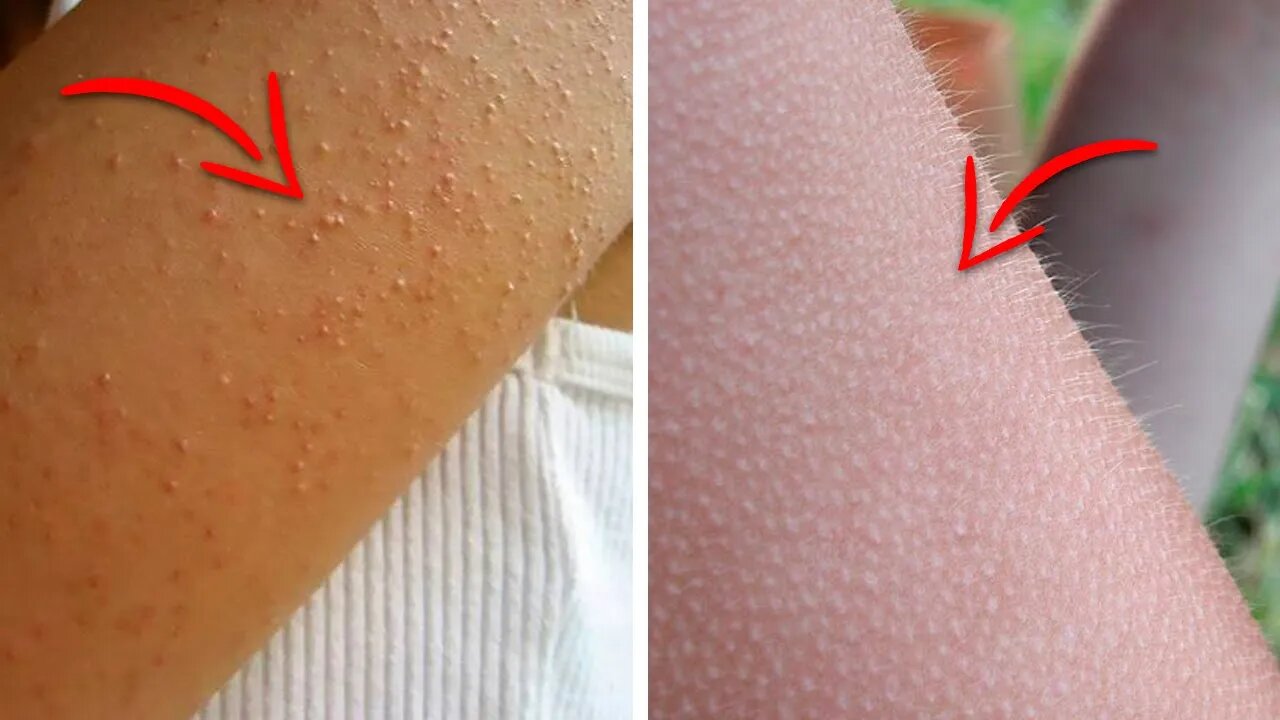Premium Only Content

Do You Have Those Tiny Bumps on Your Arms? Here's What They Mean
Have you ever heard about chicken skin?
During summer, when we wear light clothes, some people can't help but notice small bumps on their skin usually more visible on the arms and thighs.
This common skin condition is called keratosis pilaris, commonly described as "chicken skin", because it makes the skin look like a recently plucked chicken.
Although it is harmless and not contagious, chicken skin can be very annoying and, if not treated, can worsen with time.
Let's find out 6 daily things that can trigger this unpleasant skin condition:
Using too aggressive body scrubs
Although exfoliation can help lessen chicken skin, aggressive body scrubs can actually worsen your condition.
Hot showers
Although hot showers don't actually make the skin swell, being under hot water for too long can worsen your condition.
Perfumed soaps
Since chicken skin is caused by a build-up of keratin in the pores, comedogenic products can worsen the condition.
You aren't eating enough fat
When your body doesn't receive enough fatty acids omega 3 and omega 6, it may cause your skin to inflame, making the small bumps more visible.
You may be drinking too much milk
Most people can't imagine going a single day without a cup of coffee with milk or cream, but dairy can cause food sensitivities that contribute to unpleasant health conditions, including chicken skin.
Your clothes are too tight
Wearing tight clothes isn't good for your health for many reasons, and it can worsen chicken skin.
0:00 Keratosis Pilaris (Chicken Skin) Causes
0:34 Using too aggressive body scrubs
0:53 Hot showers
1:23 Perfumed soaps
1:43 You aren't eating enough fat
2:00 You may be drinking too much milk
2:30 Your clothes are too tight
----------------------------------------
Facebook: https://bit.ly/38BWbw3
Pinterest: https://bit.ly/2Irvwa6
Disclaimer: The materials and the information contained on Natural Cures channel are provided for general and educational purposes only and do not constitute any legal, medical or other professional advice on any subject matter. These statements have not been evaluated by the FDA and are not intended to diagnose, treat or cure any disease. Always seek the advice of your physician or other qualified health provider prior to starting any new diet or treatment and with any questions you may have regarding a medical condition. If you have or suspect that you have a medical problem, promptly contact your health care provider.
-
 3:40
3:40
Natural Cures
1 year ago $1.10 earnedToothpaste Is All You Need To Keep Mice Away From Your House
4.39K6 -
 2:00:05
2:00:05
Nick Freitas
14 hours agoIs Conservatism Dead?
6649 -
 22:07
22:07
Jasmin Laine
15 hours ago'You Think This Is NORMAL?!'—U.S. Official STUNS CTV With BRUTAL Mic Drop
66226 -
 LIVE
LIVE
BEK TV
22 hours agoTrent Loos in the Morning - 7/31/2025
376 watching -
 LIVE
LIVE
The Bubba Army
20 hours agoShannon Sharpe FIRED after Sex Lawsuit - Bubba the Love Sponge® Show | 7/31/25
3,912 watching -
 21:23
21:23
DeVory Darkins
1 day ago $6.63 earnedTrump makes STUNNING Admission regarding Epstein and WSJ settlement
14.6K94 -
 8:14
8:14
MattMorseTV
15 hours ago $4.84 earnedTrump just DROPPED the HAMMER.
23.2K33 -
 2:47:03
2:47:03
Patriot Underground
18 hours agoTruthStream RT w/ Joe & Scott (7.30.25 @ 5PM EST)
35.8K24 -
 42:04
42:04
World2Briggs
15 hours ago $0.83 earnedRanking All 50 States By Natural Beauty Will Shock You!
3.43K1 -
 42:46
42:46
The Kevin Trudeau Show Limitless
21 hours agoManifest Anything: The Secret Teachings of Kevin Trudeau
1.7K3